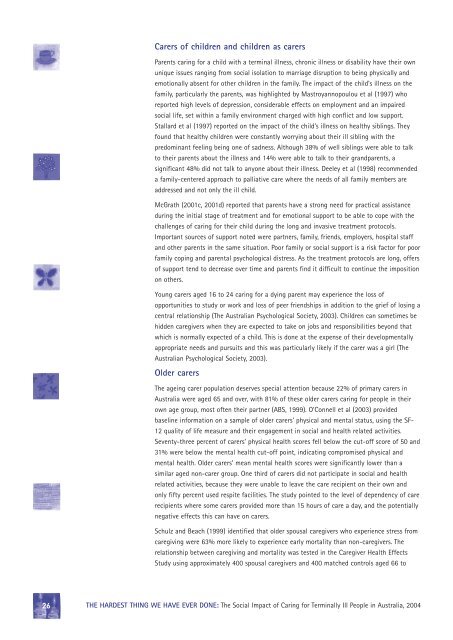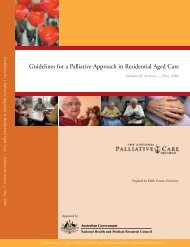The hardest thing we have ever done - Palliative Care Australia
The hardest thing we have ever done - Palliative Care Australia
The hardest thing we have ever done - Palliative Care Australia
Create successful ePaper yourself
Turn your PDF publications into a flip-book with our unique Google optimized e-Paper software.
<strong>Care</strong>rs of children and children as carers<br />
Parents caring for a child with a terminal illness, chronic illness or disability <strong>have</strong> their own<br />
unique issues ranging from social isolation to marriage disruption to being physically and<br />
emotionally absent for other children in the family. <strong>The</strong> impact of the child’s illness on the<br />
family, particularly the parents, was highlighted by Mastroyannopoulou et al (1997) who<br />
reported high levels of depression, considerable effects on employment and an impaired<br />
social life, set within a family environment charged with high conflict and low support.<br />
Stallard et al (1997) reported on the impact of the child’s illness on healthy siblings. <strong>The</strong>y<br />
found that healthy children <strong>we</strong>re constantly worrying about their ill sibling with the<br />
predominant feeling being one of sadness. Although 38% of <strong>we</strong>ll siblings <strong>we</strong>re able to talk<br />
to their parents about the illness and 14% <strong>we</strong>re able to talk to their grandparents, a<br />
significant 48% did not talk to anyone about their illness. Deeley et al (1998) recommended<br />
a family-centered approach to palliative care where the needs of all family members are<br />
addressed and not only the ill child.<br />
McGrath (2001c, 2001d) reported that parents <strong>have</strong> a strong need for practical assistance<br />
during the initial stage of treatment and for emotional support to be able to cope with the<br />
challenges of caring for their child during the long and invasive treatment protocols.<br />
Important sources of support noted <strong>we</strong>re partners, family, friends, employers, hospital staff<br />
and other parents in the same situation. Poor family or social support is a risk factor for poor<br />
family coping and parental psychological distress. As the treatment protocols are long, offers<br />
of support tend to decrease over time and parents find it difficult to continue the imposition<br />
on others.<br />
Young carers aged 16 to 24 caring for a dying parent may experience the loss of<br />
opportunities to study or work and loss of peer friendships in addition to the grief of losing a<br />
central relationship (<strong>The</strong> <strong>Australia</strong>n Psychological Society, 2003). Children can sometimes be<br />
hidden caregivers when they are expected to take on jobs and responsibilities beyond that<br />
which is normally expected of a child. This is <strong>done</strong> at the expense of their developmentally<br />
appropriate needs and pursuits and this was particularly likely if the carer was a girl (<strong>The</strong><br />
<strong>Australia</strong>n Psychological Society, 2003).<br />
Older carers<br />
<strong>The</strong> ageing carer population deserves special attention because 22% of primary carers in<br />
<strong>Australia</strong> <strong>we</strong>re aged 65 and over, with 81% of these older carers caring for people in their<br />
own age group, most often their partner (ABS, 1999). O’Connell et al (2003) provided<br />
baseline information on a sample of older carers’ physical and mental status, using the SF-<br />
12 quality of life measure and their engagement in social and health related activities.<br />
Seventy-three percent of carers’ physical health scores fell below the cut-off score of 50 and<br />
31% <strong>we</strong>re below the mental health cut-off point, indicating compromised physical and<br />
mental health. Older carers’ mean mental health scores <strong>we</strong>re significantly lo<strong>we</strong>r than a<br />
similar aged non-carer group. One third of carers did not participate in social and health<br />
related activities, because they <strong>we</strong>re unable to leave the care recipient on their own and<br />
only fifty percent used respite facilities. <strong>The</strong> study pointed to the level of dependency of care<br />
recipients where some carers provided more than 15 hours of care a day, and the potentially<br />
negative effects this can <strong>have</strong> on carers.<br />
Schulz and Beach (1999) identified that older spousal caregivers who experience stress from<br />
caregiving <strong>we</strong>re 63% more likely to experience early mortality than non-caregivers. <strong>The</strong><br />
relationship bet<strong>we</strong>en caregiving and mortality was tested in the <strong>Care</strong>giver Health Effects<br />
Study using approximately 400 spousal caregivers and 400 matched controls aged 66 to<br />
26 THE HARDEST THING WE HAVE EVER DONE: <strong>The</strong> Social Impact of Caring for Terminally Ill People in <strong>Australia</strong>, 2004
















